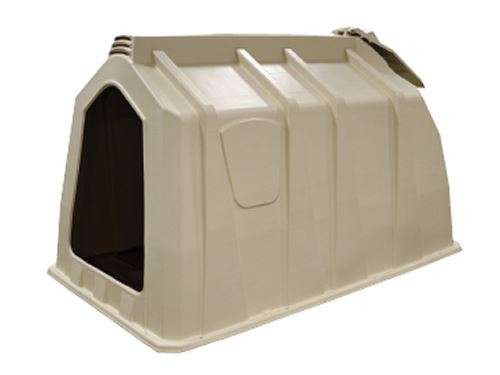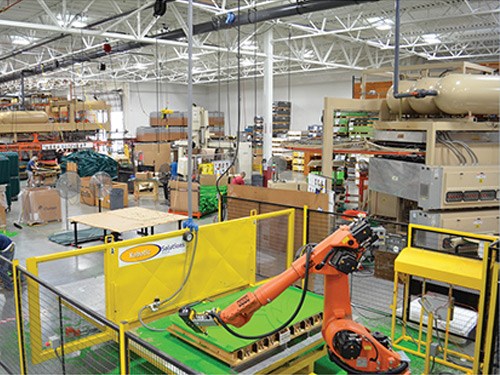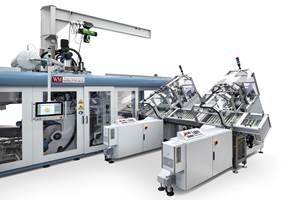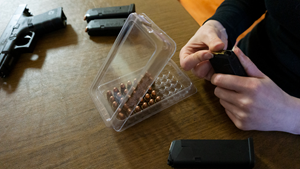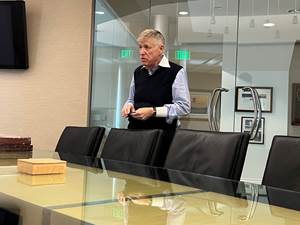‘Tough Jobs’ Are More Than A Slogan for Innovative Former
Processor Strategies
Family-owned thermoformer known for tackling difficult challenges.
“Known for doing the difficult.” That’s a phrase that has been bandied about by many processors over the years as a means to distinguish themselves from the competition in increasingly difficult times. But at Hampel Corp., it’s more than a marketing slogan—it’s an operating philosophy that has helped this Germantown, Wis. thermoformer more than double its business since 2004.
Hampel is a family-owned company started in 1976 by Lance Hampel, described as a “serial entrepreneur” by Paul Lorge, the firm’s president since 2004. Hampel is still involved in the company’s engineering efforts, and the thermoformer is still reaping the benefits of its founder’s technical acumen and entrepreneurial spirit. It holds 19 registered and five pending patents.
“We’ve historically been known as a customer-centric company that always has its eye on the future,” states Lorge. “Sometimes this is reflected in us being a practical partner to a single customer for whom we might build on demand 300,000 parts a year and ship them worldwide. On other occasions it might involve us developing a brand-new solution that solves a customer’s particular problem.”
In an example of the latter, Hampel worked with a customer who was having a problem with dumpster lids breaking along the hinge line, a critical part element. After customer meetings, Hampel developed and patented an offset twin-sheet process that allowed it to double the thickness of the lid only at the hinge line, thereby producing a better part for the client without increasing costs.
Hampel currently operates out of a 168,000 ft² facility in Germantown, and just recently broke ground on another 30,000 ft² expansion. Its sales, roughly $13 million in 2004, are now $30 million. Its end markets include lawn and garden, agricultural, renewable energy, transportation, and portable sanitation.
Hampel’s facility includes 10 production stations, or cells, eight of them centered on three- or-four-station machines, with the other two being single-station. Each cell is supported by a 5-axis CNC trim cell or a 6-axis robotic trim cell. “We have truly embraced lean and cell-based manufacturing techniques,” states Lorge. “The idea is to form and trim within each cell so that a finished product is produced with minimal touches.”
Lorge estimates that 20% of Hampel business is in twin-sheet forming. But the firm is doing innovative things with single-sheet structures as well. It has a line of shipping pallets called Steelspan, so named because it is made by a proprietary process in which a steel reinforcing wire is encapsulated in HDPE sheet in the mold. The pallet can straddle an open rack with a 2000-lb load indefinitely, yet weighs only 26 lb itself, well below the 40-lb ergonomic safety guideline. The product reportedly has the integrity of injection molded structural-foam pallets with significantly lower tooling costs.
Hampel also put this technology to work on what is perhaps its most well-known product line: hutches for dairy calves. Called the Calf-Tel, the hutch features a steel frame encapsulated into 0.375-in. HMW-HDPE sheet. Hampel has made many thousands of calf housings since 1981, but in October of this year received an award from the Society of Plastics Engineers (SPE) Thermoforming Division for the steady improvements it has made to Calf-Tel since introducing the product. Improvements in part size, depth of draw, undercuts, weight, and nesting were sited by the SPE in the award.
The part features a draw depth of 67 in., said to be one of the industry’s deepest. Other notable innovations throughout the product’s history have included unique undercuts that release from the tool without requiring a core pull, a sophisticated draw box, an efficient 1.5 in. nest, and the company’s selective twin-sheet process to provide increased strength in a critical door hinge area without adding thickness elsewhere.
Related Content
Automation in Thermoforming on the Rise
Equipment suppliers’ latest innovations exemplify this trend driven by factors such as labor shortages, higher-speed thermoformers and tighter quality control.
Read MoreNovel ‘Clamtainer’ Extends Thermoformer's Reach in Packaging
Uniquely secure latching expands applications for Jamestown Plastics’ patented clamshell package design.
Read MoreA Processor's Perspective: What's Driving Growth in Heavy-Gauge Thermoforming
Key factors for the progress are innovative materials, advanced automation and precision engineering.
Read MoreUS Merchants Makes its Mark in Injection Molding
In less than a decade in injection molding, US Merchants has acquired hundreds of machines spread across facilities in California, Texas, Virginia and Arizona, with even more growth coming.
Read MoreRead Next
See Recyclers Close the Loop on Trade Show Production Scrap at NPE2024
A collaboration between show organizer PLASTICS, recycler CPR and size reduction experts WEIMA and Conair recovered and recycled all production scrap at NPE2024.
Read MoreLead the Conversation, Change the Conversation
Coverage of single-use plastics can be both misleading and demoralizing. Here are 10 tips for changing the perception of the plastics industry at your company and in your community.
Read MorePeople 4.0 – How to Get Buy-In from Your Staff for Industry 4.0 Systems
Implementing a production monitoring system as the foundation of a ‘smart factory’ is about integrating people with new technology as much as it is about integrating machines and computers. Here are tips from a company that has gone through the process.
Read More

